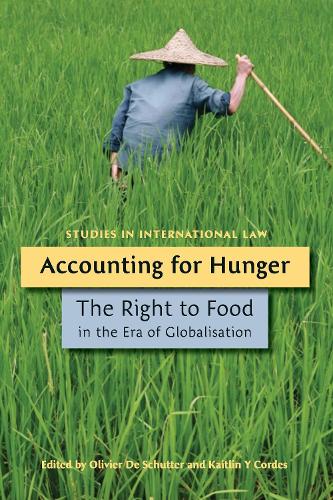
Accounting for Hunger: The Right to Food in the Era of Globalisation
(Hardback)
Publishing Details
Accounting for Hunger: The Right to Food in the Era of Globalisation
By (Author) Professor Olivier De Schutter
Edited by Kaitlin Y Cordes
Bloomsbury Publishing PLC
Hart Publishing
14th November 2011
United Kingdom
Classifications
Tertiary Education
Non Fiction
Social impact of disasters / accidents (natural or man-made)
Public international law: human rights
338.19
Physical Properties
Hardback
288
Width 156mm, Height 234mm, Spine 23mm
597g
Description
The challenge of global hunger is now high on the agenda of governments and international policy-makers. This new work contributes to addressing that challenge, by looking at the obstacles which stand in the way of implementing a right to food in the era of globalisation. The book describes the current situation of global hunger; it considers how it relates both to the development of food systems and to the merger of the food and energy markets; and it explains how the right to food contributes to identifying solutions at the domestic and international levels. The right to food, it argues, can only be realised if governance improves at the domestic level, and if the international environment enables governments to adopt appropriate policies, for which they require a certain policy space. The essays in this book demonstrate that the current regimes of trade, investment and food aid, as well as the development of biofuels production all of which contribute to define the international context in which states implement such reforms should be reshaped if national efforts are to be successful. The implication is that extraterritorial human rights obligations of states (their obligations to respect the right to food beyond their national territories, for instance in their food aid, investment or trade policies), as well as the strengthening of global governance of food security (as is currently being attempted with the reform of the Committee on World Food Security in Rome), have a key role to fulfill: domestic reforms will not achieve sustainable results unless the international environment is more enabling of the efforts of governments acting individually. In this reform process, accountability both at the domestic and international level is essential if sustainable progress is to be achieved in combating global hunger.
Author Bio
Olivier De Schutter is the UN Special Rapporteur on the Right to Food, Professor of Law at the Universte Catholique de Louvain and College of Europe, and Visiting Professor, Columbia University. Kaitlin Y Cordes works for Human Rights Watch.
